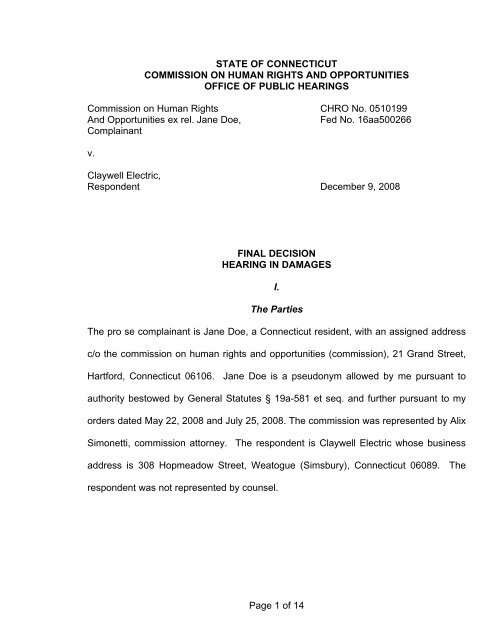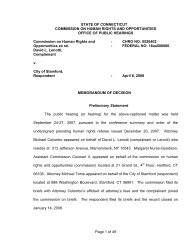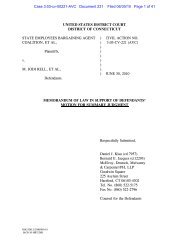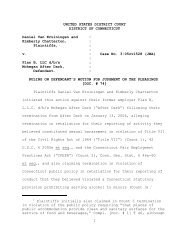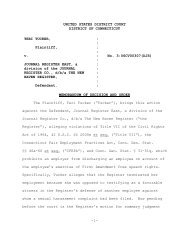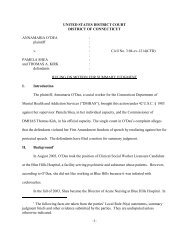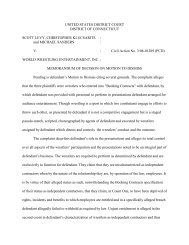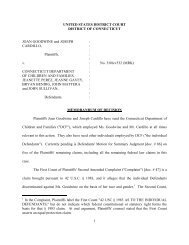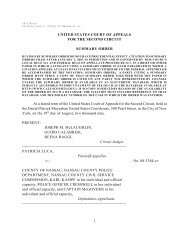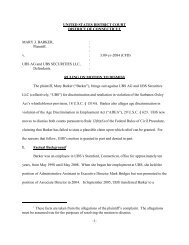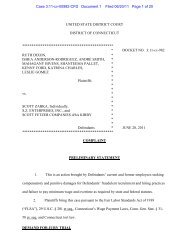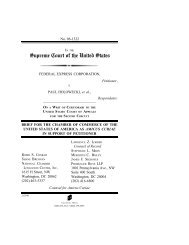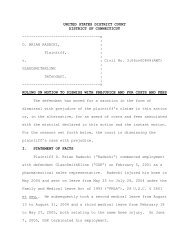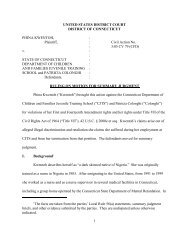CHRO ex rel. Doe v. Claywell Electric - Connecticut Employment ...
CHRO ex rel. Doe v. Claywell Electric - Connecticut Employment ...
CHRO ex rel. Doe v. Claywell Electric - Connecticut Employment ...
Create successful ePaper yourself
Turn your PDF publications into a flip-book with our unique Google optimized e-Paper software.
complainant between the chair and the desk in his office whereupon he put his handsaround the complainant’s waist and slid them down and rubbed her thigh. Thecomplainant objected and the incident ended when they were interrupted byrespondent’s bookkeeper, Barbara Mangesi (Barbara). A day later (September 15,2004), annoyed that the complainant was not speaking to him, <strong>Claywell</strong> threw books atthe complainant’s feet as she was trying to pack them. On September 15, 2004 afterthe complainant had <strong>ex</strong>pressed her displeasure with <strong>Claywell</strong> for berating her unfairly,<strong>Claywell</strong> suggested that he bring in a bottle of liquor so that they might drink togetherand she (complainant) could then go home and have “s<strong>ex</strong> with men.” The complainantobjected to this line of conversation but <strong>Claywell</strong> persisted. On September 20, 2004,<strong>Claywell</strong> rubbed his arm up against the complainant’s chest and grabbed her breast asshe attempted to access the copy machine. He told the complainant to loosen up and<strong>rel</strong>ax and again put his hands on the complainant in a controlling manner. Told to stop,he did so, but again started talking about alcohol and s<strong>ex</strong>. On September 22, 2004,while the complainant was cleaning up old blue prints, <strong>Claywell</strong> commented about thecomplainant’s “muscles” and “great body.” <strong>Claywell</strong> touched the complainant on thearm and she left the premises in protest.The complainant then decided she must leave the respondent’s employ and after alibrary computer search, determined that <strong>Claywell</strong> had previously been charged withcriminal s<strong>ex</strong>ual misconduct, and found guilty on two occasions. The complainant issueda letter of resignation on or about September 24, 2004 by certified mail, which wasrefused and unclaimed.Page 5 of 14
is entitled to a judgment for the full amount of the <strong>rel</strong>ief claimed. The plaintiff must stillprove how much of the judgment prayed for in the complaint he is entitled to receive.”(Internal quotation marks omitted.) Murray v. Taylor, supra, 65 Conn. App., 334, 335.A.Emotional DistressAs I have previously held in Commission on Human Rights & Opportunities <strong>ex</strong> <strong>rel</strong>.DiMicco v. Neil Roberts, Inc., 2006 WL 4753466 (<strong>CHRO</strong> No. 0420438, September 12,2006), the inclusion of a claim under General Statutes § 46a-58 (a) in the complaintaffidavit of an employment discrimination case, allows me to convert federal claims (aswere made here) into claims under <strong>Connecticut</strong> law, and to award damages foremotional distress pursuant to General Statutes § 46a-86 (c). My finding in DiMicco (asin the case before me now) was made in <strong>rel</strong>iance on Commission on Human Rights &Opportunities <strong>ex</strong> <strong>rel</strong>. Tina Saddler v. Margaret Landry dba Superior Agency, 2006 WL4753474 (<strong>CHRO</strong> No. 0450057, May 23, 2006), which in turn was predicated on thefindings made by the <strong>Connecticut</strong> Supreme Court in Commission on Human Rights &Opportunities v. Board of Education of the Town of Cheshire, 270 Conn. 665 (2004).While the complainant offered no <strong>ex</strong>pert or corroborative testimony to support her claimfor damages for emotional distress, a complainant need not present medical testimony,and, in fact, her own testimony may suffice. Schanzer v. United Technologies Corp.,Page 9 of 14
140 F. Sup. 2d 200 (D. Conn.2000). Medical testimony, however, can strengthen such aclaim. Busche v. Burkee, 649 F. 2d 509 (7 th Cir. 1981).The <strong>rel</strong>evant factors to consider in awarding damages for emotional distress include: 1)whether the discrimination occurred in front of others, 2) the degree of offensiveness ofthe discrimination and, 3) the subjective internal emotional reaction of the complainant.Commission on Human Rights & Opportunities <strong>ex</strong> <strong>rel</strong>. Peoples v. Estate of EvaBelinsky, 1988 WL 492460 (Conn. Super. November 8, 1988). Most of <strong>Claywell</strong>’s actsof discrimination and harassment were not witnessed, although Barbara witnessed andin fact interrupted the September 8, 2004 incident. The most disturbing characteristic of<strong>Claywell</strong>’s workplace actions (fully attributable to the respondent entity) is that theyappear to have been designed to intimidate and humiliate. He would uniformly wait untilthe complainant was virtually defenseless before engaging in his groping, fondling andpropositioning. The tactics included (previously recounted in part):• pinning the complainant between his chair and his desk rendering her virtuallyimmobile;• confronting her while she was seated on the floor and confined to a spacemeasuring perhaps no more than eighteen square feet and throwing books ather while so immobilized;• dumping documents in her arms which were already full of documents to becopied and thus defenseless, and• surprising and pinning the complainant in a closet as a p<strong>rel</strong>ude to an assault.Page 10 of 14
There was evidence that numerous other females had left the respondent’s employshortly after their hire, presumably (and in the complainant’s belief) because of similarpredatory activity. The complainant, when silent and clearly annoyed with <strong>Claywell</strong>, wassent to small rooms for “make work” projects where she was then confronted andharassed by him. It would not be an unwarranted stretch to conclude that thecomplainant was hired for the singular reason that she was deemed by <strong>Claywell</strong> to be asuitable target for s<strong>ex</strong>ual harassment, a seemingly strong component of therespondent’s raison des etres.Because of <strong>Claywell</strong>’s success in isolating, surprising and disabling the complainant inadvance of his groping and propositioning, he achieved maximum shock value, whichgreatly heightened the degree of offensiveness and the intensity of complainant’sinternal emotional reaction. These reactions could only have been <strong>ex</strong>acerbated by<strong>Claywell</strong>’s throwing heavy books at her feet and legs while she sat helpless on the floor– actions he clearly felt were warranted because of the complainant’s “lowly” femalestatus and her previous rejections of his initiatives.There are matters such as <strong>Claywell</strong>’s vindictive and unjustified summoning of the policein his trespassing claim, and the concern and aggravation sustained by the complainantin her assistance to the authorities in <strong>Claywell</strong>’s criminal prosecution, that a court mightwell deem worthy of compensation in a civil action against <strong>Claywell</strong>, one that mightinclude claims for battery and false imprisonment. Without clear authority, however, toconsider such matters in an administrative hearing on employment discriminationPage 11 of 14
against <strong>Claywell</strong>’s business entity, I believe I must limit my award to actionable s<strong>ex</strong>ualdiscrimination and s<strong>ex</strong>ual harassment that occurred in the workplace during the term ofthe complainant’s employment, and the resulting constructive discharge.That being said, there is enough evidence within this tribunal’s rightful purview of thatwhich occurred during the complainant’s twenty two day employment ordeal to justify asubstantial award for emotional distress.In setting my award for emotional distress I use as a reference my decision in DiMiccov. Neil Roberts, Inc., supra, 2006 WL 4753474 (which itself referenced other recentcommission awards for emotional distress in support of its conclusion) in which sixthousand ($6,000) dollars was awarded for workplace s<strong>ex</strong>ual harassment. In DiMicco,the individual perpetrator, while a supervisor, was essentially more “smitten” thanpredatory, pathetic than hostile, and while his advances were clearly unwelcome andannoying, they were not calculated to frighten, surprise and demean, as were thepredatory advances of <strong>Claywell</strong>. Upon careful review of the evidence and recentcommission awards for emotional distress, I herewith award the sum of fifteen thousand($15,000) dollars for emotional distress.B.Lost WagesThe complainant’s efforts to mitigate her damages (subsequent to a reasonable andwell earned period needed to decompress and recharge) were not compelling. AsPage 12 of 14
previously found, she was unwilling to work in the presence of any men (whileproducing no <strong>ex</strong>pert testimony supporting the reasonableness of this blanketprohibition), limited her media job search resources to a single local periodical, andseemingly required that an employer be located in her immediate suburban environsoffering highly restricted hours acceptable to her. The complainant has requested lostearnings in the amount of one hundred twenty dollars ($120) per week (12 hours x 10dollars per hours). I am prepared, due to the seriousness of the abuse she enduredleading to her constructive discharge, to award lost wages for a period of six months (26weeks) and therewith set the award for such wages at three thousand one hundredtwenty dollars ($3,120). I do find that reasonably suitable employment could and shouldhave been secured (in the cont<strong>ex</strong>t of evaluating mitigation efforts) after a six monthrecuperation.V.InterestPursuant to Thames Talent Ltd. v. <strong>CHRO</strong>, 265 Conn. 127 (2003), pre-judgment andpost-judgment interests are awarded on the lost wages award and post-judgmentinterest on the emotional distress award (an allowance for lawful pre-judgment interesthaving been factored into the rounded award for emotional distress).Order of Relief1. The respondent shall pay the complainant the following:a. Back pay in the amount of $3,120.Page 13 of 14
. Emotional distress damages in the amount of $15,000.c. Prejudgment interest (compounded and rounded) on the back pay in theamount of $1,310.2. The respondent shall cease and desist from the practice complained ofconcerning the complainant and concerning all employees who may or will in thefuture become similarly situated.3. The respondent shall not engage in or allow any of its employees to engage inany conduct against the complainant or any party to or participant in theseproceedings in violation of General Statutes § 46a-60 (a) (4).4. All moneys paid to the complainant shall include post judgment interest in theamount of 10% compounded per annum to the date of payment.5. The respondent shall post at all <strong>Connecticut</strong> business locations the commissionposters concerning equal employment in conspicuous places visible to allemployees and applicants for employment (see General Statutes §§ 46a-54 (13)and 46a-60).It is so ordered this 9 th day of December 2008._______________________J. Allen Kerr, Jr.,Presiding Human Rights Refereecc.Jane <strong>Doe</strong>Kurt <strong>Claywell</strong><strong>Claywell</strong> <strong>Electric</strong>Alix Simonetti, Esq.Page 14 of 14


